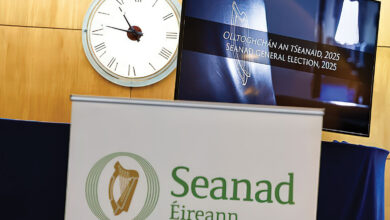Political Platform
 Anne Ferris is Labour’s TD for Wicklow and Vice-Chair of the Oireachtas Justice, Defence and Equality Committee. Anne was previously personal assistant to her predecessor, Liz McManus TD, and was also a member of Bray Town Council and Wicklow County Council prior to her election to Dáil.
Anne Ferris is Labour’s TD for Wicklow and Vice-Chair of the Oireachtas Justice, Defence and Equality Committee. Anne was previously personal assistant to her predecessor, Liz McManus TD, and was also a member of Bray Town Council and Wicklow County Council prior to her election to Dáil.
How did you get involved in politics?
When I moved to Bray with my family in 1985, I met Liz McManus. Liz stood for many of the issues that were already occupying much of my thinking – women’s rights, educational opportunities and access to health care – but on a party political platform. I started to canvas for her, knocking on doors and handing out leaflets. More can be learned on a single doorstep than from any amount of media polls. At least on the doorstep, it’s a two-way conversation and both parties can walk away knowing something new.
I’ve been a member of Bray Town Council and Wicklow County Council. In 2007, I became just the second woman Cathaoirleach of Wicklow County Council in over 100 years. Sadly, the current council has no woman councillor in any position of leadership, despite having a record percentage of women members. In 2011, I was elected to Dáil Éireann on my first attempt.
What have been your main achievements to date?
My main achievements are my three daughters. I often think of their futures, and their children’s futures when making political decisions. I think of the kind of Ireland we want future generations to be able to live in.
It’s no secret that my Open Adoption Bill, which has now progressed to committee stage, was inspired by the experience of losing my firstborn daughter to adoption and not meeting her again for 23 years. Open adoption will help today’s adopted children maintain access with their birth families throughout childhood. If my adopted daughter had been given the opportunity to maintain contact with me and her other sisters, it would have saved a lot of heartache.
When I lost the Labour Party whip for voting against the Government on the issue of fatal foetal abnormalities, I listened to the young parents who had gone through the terrible ordeal of being forced to travel abroad in order to terminate a dying pregnancy with some dignity. Like most Irish people, I thought “What if that happened to my daughter?” Then I made my decision.
Some of the most difficult decisions that this Government has had to make have been about the next generation. Ireland’s economic crash had a disproportionate effect on young people. The main achievement of this Government has been in stopping the catastrophic increase in unemployment and returning the economy and job creation to a state of growth.
What are your main ambitions for Wicklow?
It’s difficult being the only remaining elected Labour politician in County Wicklow. So much of what needs to be done for Wicklow lies within the power and responsibility of local government. Recently, I made a very long submission on the proposed new Wicklow County Development Plan. Would you believe that the words ‘tourism’ and ‘landscape’ are completely absent from the strategic goals in the current county plan? This is the county that Michelle Obama chose to take her daughters to visit on a brief trip to Ireland.
On a national level, Wicklow is already benefiting from jobs growth with the constituency itself and in adjoining Dublin. I hope to see unemployment fall to single figures this year. That will have a significant impact on consumer confidence and the growth of small businesses and retail. The choice and quality of schools in the constituency is much improved since Labour took over the education portfolio. I want to see the cost of living for families come down further. Rents and the cost of owning a home are still too high.

Which issues are the most significant in your committee’s brief?
I’m very proud of my work in drafting the committee’s report and recommendations to government on the shameful problem of domestic violence.
I was also very pleased to see my recommendations for a fully independent Garda authority, along the lines of the Scottish model, being adopted by the committee. I had been the lead author of a Labour Party report recommending this very approach.
Restorative justice is a particular interest of mine and I was pleased to announce the committee’s proposal for a pilot scheme in the Dublin area to apply community justice principles to appropriate crimes where victims and perpetrators can jointly have an input into agreeing a non-custodial penalty.
How can Labour best approach the next general election?
Honesty and clarity will go a long way. Labour has a good story to tell about our role in this Government but the party hasn’t always been clear in communicating that message. Where we failed to deliver on electorate expectations, then we need to honestly explain why.
Some aspects of our core beliefs should be non-negotiable in government, even in times of economic turmoil. The economy shouldn’t affect our attitude to adoption information or abortion rights or marriage equality. These are basic human rights that transcend economic strategies.
How do you spend your free time?
When I’m not working, I read a lot. I like getting out meeting people and especially friends and family.
I’m not very athletic. I did a parachute jump many years ago. Taking a blind jump for something you believe in isn’t such a big deal.





